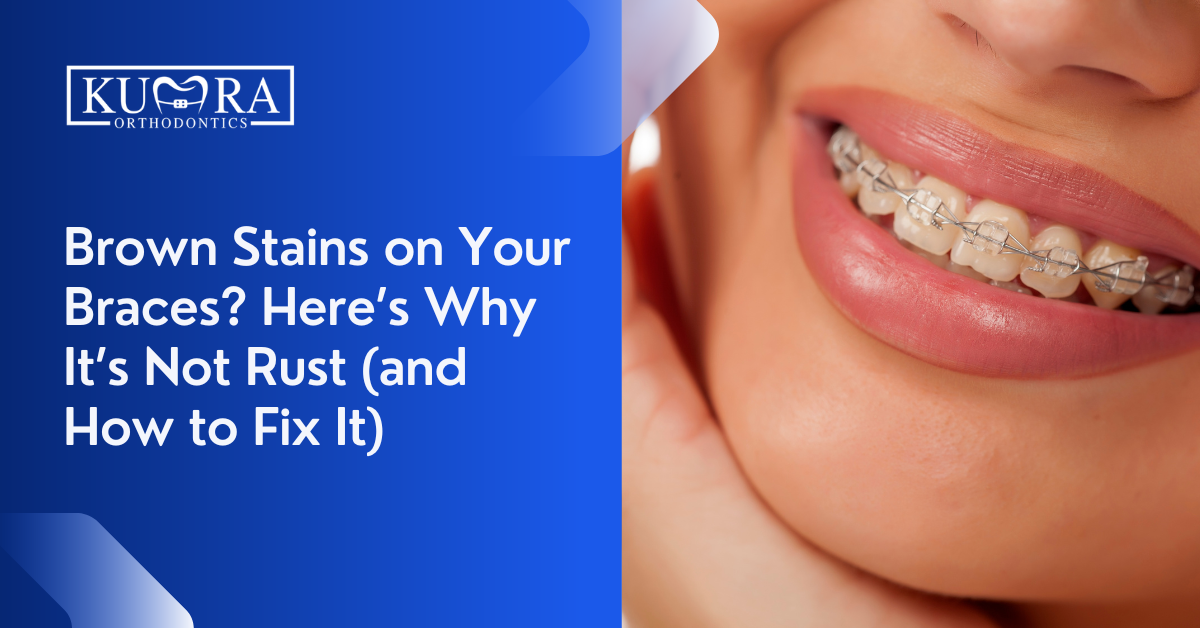Seeing a brown, orange, or even black spot on your metal braces can be scary. Your first thought might be the worst-case scenario: rust. It’s a logical leap, but let us put your mind at ease. That discoloration you’re seeing isn’t a sign of cheap or failing materials. You’re experiencing a common and fixable aesthetic issue, and we’re here to walk you through what it is, why it happens, and what to do about it.
The Quick Answer: No, Your Braces Are Not Rusting
Let’s be clear and direct: modern orthodontic braces from a certified orthodontist will not rust. The materials used are specifically chosen for their durability and biocompatibility, meaning they are designed to exist safely in the human mouth for years without corroding. Your braces are typically made of high-grade materials like stainless steel and titanium alloys, which are incredibly resistant to rust.
“As an orthodontist, patient safety is my absolute priority. The materials we use are biocompatible and designed to live in the mouth for years without corroding. What you’re seeing isn’t a material failure; it’s almost always a hygiene issue we can easily solve together.” – Dr. Bob Kumra, Kumra Orthodontics
This immediate reassurance is key. The problem isn’t with the braces themselves, but with buildup on the surface of the braces.
So, What IS That Brown, Orange, or Black Stuff on My Braces?
If it’s not rust, then what is causing this alarming discoloration? The culprits are far more common and much less frightening. It boils down to a few key things that can build up on and around your brackets and wires.
Plaque and Tartar Buildup
The most common cause of discoloration is plaque and its hardened form, tartar. Plaque is a soft, sticky film of bacteria that constantly forms on your teeth. If it’s not removed thoroughly, it hardens into tartar (also called calculus), which is a calcified deposit that can appear yellow or brown.
Think of it like the grout between tiles. The brackets and wires on your teeth create dozens of tiny nooks and crannies where plaque can hide and accumulate. When this plaque stays put, it hardens and becomes stained, leading to the “rusty” appearance you’ve noticed.
Stains from Foods, Drinks, and Habits
Just like your teeth, your braces can be stained by what you consume. Certain foods and drinks are notorious for their potent pigments that can discolor both the dental cement used to bond the brackets and the elastic bands.
The biggest offenders include:
- Coffee
- Black Tea
- Red Wine
- Curry and Tomato-Based Sauces
- Dark Sodas
- Smoking or Vaping
Stained Elastic Ligatures (The Rubber Bands)
Often, the true source of the color change isn’t the metal bracket at all, but the tiny elastic band (ligature) that holds the archwire to the bracket. These elastics are porous and highly susceptible to staining. If you’ve been enjoying curry, for instance, you might notice your elastics have taken on a yellow tint. The good news is that these elastics are changed at every single adjustment appointment, giving you a fresh start. In our Washington, D.C., and Stafford offices, we often see patients who love curry dishes come in with yellow-tinted elastics. It’s completely normal and gives us a chance to provide a fresh, clean set!
The Ultimate Playbook for Preventing and Removing Braces Stains
Now that you know the cause isn’t rust, you can shift from worry to empowerment. Keeping your braces sparkling clean is achievable with a proactive approach to oral hygiene. This is your guide to preventing and managing stains.
Master Your Brushing: The Angles That Matter
Brushing with braces requires a special technique. The key is to use a soft-bristled or electric toothbrush and detail the 45-degree angle technique for brushing both above and below the brackets to effectively clean around them.
Flossing with Braces: Your Best Friends (Water Flosser & Threaders)
Traditional flossing is difficult with braces. Superior tools can make all the difference. A water flosser is excellent for blasting away debris from around brackets, while floss threaders are essential for getting floss under the wire to clean between teeth. Consistent interdental cleaning is crucial for preventing the plaque buildup that leads to stains and decay.
The “White Braces” Diet: Smart Food Swaps
You don’t have to completely avoid your favorite foods, but making smart swaps can make a big difference.
| Eat This | Not That |
| Clear Herbal Tea | Coffee, Black Tea |
| White Wine/Clear Spirits | Red Wine |
| Light-Colored Sauces (Alfredo, Pesto) | Curry, Tomato Sauce |
Framing it as “smart swaps” rather than total restriction can help you maintain your habits while minimizing stains.
Worried It’s Something More? When to Call Kumra Orthodontics
We want to reassure you one last time: rust on your braces is virtually impossible. However, if you notice stains that don’t go away with diligent brushing and you’re concerned, you should always feel comfortable reaching out. You’re never alone in your orthodontic journey. Our team is here to help with any concerns, big or small. Frame the call as a partnership. This manages your anxiety and funnels you directly into our care system. This is the primary, direct Call-to-Action.
Your regular appointments are the perfect time to address these issues. We can professionally clean away any tartar buildup and replace stained elastics. If you have a concern that can’t wait, we encourage you to schedule a check-up.
Don’t hesitate to connect with our expert team at our Washington, DC, or Stafford, VA locations. Schedule your consultation today and let us ensure your treatment is on track and your smile stays bright.
Want to Avoid Stains Altogether? The Invisalign® Advantage
Experiencing the hassle of keeping braces clean can make you wonder about other options. This is a perfect moment to consider the benefits of an alternative like Invisalign®. Since Invisalign aligners are completely removable, they offer a distinct advantage: you can eat and drink whatever you want without worrying about stains.
You simply take the aligners out for meals and oral hygiene. This means you can brush and floss normally, completely eliminating the issue of plaque and stains building up around brackets. It’s a powerful and convenient option for achieving a beautiful smile.
To learn more about how Invisalign could be a better fit for your lifestyle, you can learn more about Invisalign at Kumra Orthodontics.
Your Questions, Answered (FAQ)
- Can the metal wire on my braces rust?
No, the archwire is also made of special, non-corrosive memory-shape alloys that will not rust. Discoloration on the wire is also due to surface buildup. - How do you get rid of brown stains on braces?
Start with the “Ultimate Playbook” above: refine your brushing technique, use a water flosser, and make smart food swaps. For hardened tartar, you will need a professional cleaning at your orthodontist’s or dentist’s office. - Will the stains on my braces be permanent on my teeth?
If the stain is from plaque, it can lead to permanent marks on your teeth called decalcification (white spots) or even cavities if not addressed. This is why hygiene is so critical during orthodontic treatment. We can help you prevent this! - Do ceramic (clear) braces stain?
The ceramic brackets themselves are very stain-resistant. However, the clear elastic ties used with them stain very easily, which can give the appearance of stained braces. This is a great reason many patients opt for Invisalign.



